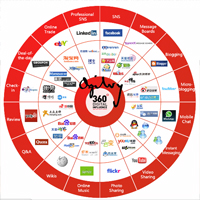China Paints Social Media and Arab Revolution as Info-Opium Trade From the West
2011 has been the year when social media has become a central story in international politics.
This grew through a global series of online protests in 2008, the “Twitter revolution” in Moldova in 2009, and Wikileaks in 2010. Suddenly Mark Zuckerberg is the hero of the Arab people (see the 60 Minutes‘ Bob Simon interview with Tunisians), and Egyptians are naming children after Facebook. This is real transformative power, and that’s not lost on political leaders in China.
The Web as Political Magic or Western Manipulation?

Both western and Arab observers see Tunisia and Egypt as examples of the political magic that comes when people are connected and enabled by networks and mobile devices. But party hardliners in China see this as an unambiguous threat. They’ve used the “great firewall of China” to block content about Arab countries in revolution. To them, the story is not about the empowerment of people by information technology; it’s about the national interests that social media serves – specifically, the United States.
China Bolsters Public Sentiment Against Western Digital Media
 The Chinese press, and yes I am speaking of it as a consolidated entity, is building a familiar “online threat from the West” story arc, intended to galvanize national sentiment against the West, which is set on world conquest through a monopoly trade in dangerous products. Not opium; information. On Friday, “web user” Zheng Yan wrote an article which appeared on the CCP’s official People’s Daily, and since has been cross-posted to 300 websites in China including including Xinhua Online, QQ.com, China Youth Daily Online and Sina.com.
The Chinese press, and yes I am speaking of it as a consolidated entity, is building a familiar “online threat from the West” story arc, intended to galvanize national sentiment against the West, which is set on world conquest through a monopoly trade in dangerous products. Not opium; information. On Friday, “web user” Zheng Yan wrote an article which appeared on the CCP’s official People’s Daily, and since has been cross-posted to 300 websites in China including including Xinhua Online, QQ.com, China Youth Daily Online and Sina.com.
The articles thesis is that “Google is not just a search engine tool — it is a tool to extend American hegemony.” Zheng calls the California-based search goliath “America’s British East India Company.” Just as the American press featured thematic coverage on the dangers of crime and internet sex abuse on the emerging Internet, the Chinese press is starting a story arc of digital nationalism. As this theme of digital nationalism is expanded, you might enjoy the useful grid (okay, infographic) developed by Ogilvy that compares US social media to their Chinese competitors.
The story has both Google and the US as the bad guys, and a brave defender as a national hero: Chinese search engine Baidu.
Enjoy the read…
“From the East India Company to Google”
People’s Daily
March 4, 2011
By Zheng Yan (??)As an American company, Google’s enthusiasm for the politics of other nations goes beyond what is right.
Recently, Google, Facebook, Twitter and other American Internet giants have participated directly in the social storm that has engulfed the Middle East. They have played a key role in manufacturing social disorder, serving a role entirely inappropriate to their status. Wael Ghonim, Google’s chief representative in the Middle Eastern and North African markets even rendered assistance to Mohamed ElBaradei in driving forward the anti-government movement [in Egypt], becoming the chief agent behind Egyptian demonstrations. The facts have shown that Google is not purely a company, that it seeks not only to make the money of other nations, but also meddles in the political affairs of other countries. It is not just a search engine tool — it is a tool to extend American hegemony.
In the Internet age, whoever dominates the Internet dominates the world. As the world’s leading hegemonic power, America has always prioritized the Internet and sought to use the Internet as a means of promoting America’s national interests around the world. Google has been very cooperative with this strategic motive of the United States government, and [its cooperation] has been active.
The enterprise with the world’s highest online traffic, Google monopolizes the online search engine markets for the vast majority of nations and regions in the world, and it has the capacity to dominate online information, widely propagate lies and influence [the information] climate. When a number of countries in the Middle East experienced signs of instability due to inflation and other problems, Google immediately went on the offensive, even allowing a senior company manager to directly establish the online general headquarters of the anti-government movement, fostering successive protest movements and nakedly interfering with the internal politics of other nations. These actions of Google’s are astonishing, and they lead people naturally to recall the British East India Company.
In the 17th, 18th and 19th centuries, the British East India Company, through the monopolization of trade, the sale of opium and open plunder, accomplished great works for England in its development of an “empire on which the sun never sets.” Marx once said concerning the British East India Company that there was a 200-year history of the British government carrying out wars in the name of this company, until this reached the natural boundaries of India.
In the colonial era, the British East India Company used the monopolization of trade in the colonies to traffic opium and assist Britain in building its hegemony. In the Internet era, Google uses its monopoly of Internet information search to traffic American values and assist American in building its hegemony.
While there are differences in the ways the two [companies] served hegemony, they are uncannily alike in the way they rely upon hegemonic governments to interfere in the internal affairs of other nations and attain monopoly positions globally. It can be said that today’s Google is America’s British East India Company.
At its heart, Google is quite similar to the British East India Company. But in managing its outward appearance it is far more skillful than the British East India Company ever was. Google does not burn, kill and pillage, but rather is a master of disguises. Against the modus operandi of the British East India Company, which was to “carry out trade when necessary and plunder when possible,” Google’s slogan is far more bewitching: “Do no evil.” The problem is that no company on earth “does evil” as a matter of creed, and it is a bit hypocritical for Google to say it “does no evil.” The facts show that this “Do no evil” is actually an admission of guilt through a protestation of innocence.
This company that claims to “do no evil” has cooperated with America’s National Security Agency to monitor the private information of American citizens. It has been taken to court by publishing companies in France, Germany, Belgium and many countries for violations of copyright. It has been compelled by China and other countries to clean up its act because it disseminates pornographic content. And most recently it has also openly released subversive information, fomenting unrest in other countries. Before the facts, Google’s creed of “Do no evil” is like a joke. Is it any wonder that Apple CEO Steve Jobs once said that Google’s “Do no evil” creed was complete nonsense?
A company that hold a monopoly position in its industry is of course formidable, but Google is not without its enemies under heaven. In China, it was strongly blocked by Baidu. According to statistics from the China Internet Network Information Center, Baidu held 75.5 percent of China’s domestic search engine market in the fourth quarter of 2010, and Google’s share of the market, which had fallen for four consecutive quarters, stood at just 19.6 percent . . . Losing its competitive advantage, this Google which had swept across the entire world market, was furious with shame and started playing the political card.
[This portion includes a summary of Google’s pullout from China, and how China remained determined to “govern the Internet in accordance with the law” despite Google’s arrogant exceptionalism.] But this momentary setback could not deter a company like this from its ways. Seizing on social unrest in the Middle East, it once again raised its ugly head and again it sought to play the political card against China. China has no illusions about such a company. It disregards basic truth and international law to wantonly interfere in the internal affairs of other nations. China has the right to monitor and control it in accordance with Chinese laws and regulations.
During the Opium Wars more than a century ago, the British East India Company forced open the doors of China with its own gunships, sending China into a century of chaos and leaving Chinese with a bitter history of humiliation. Today, China will not stand by and let a new British East India Company repeat the events of history.

 The future of digital experiences will be built by strategists who grasp the full array of emerging business, social, and technical models. Specialties in user experience, branding, application design, and data science are laying the foundation for richer user experiences and business models breakthrough products and revenue based marketing.
The future of digital experiences will be built by strategists who grasp the full array of emerging business, social, and technical models. Specialties in user experience, branding, application design, and data science are laying the foundation for richer user experiences and business models breakthrough products and revenue based marketing.